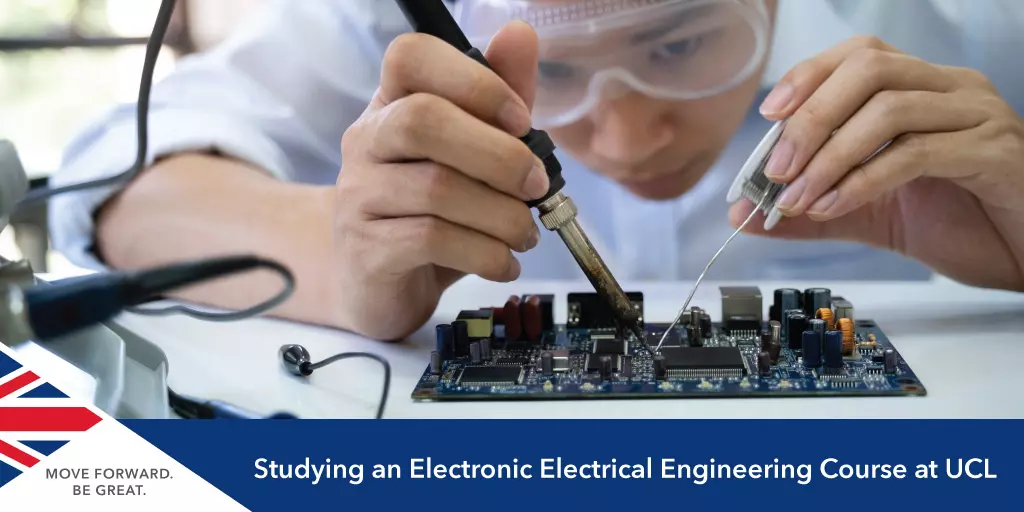University College London is one of the world’s most prestigious universities, ranking 8th globally in the QS World University Rankings 2023 and being a perennial top ten UK university in almost all major rankings over many years. UCL currently ranks 5th in the UK for Engineering and Technology (QS 2022) and its Department of Electronic and Electrical Engineering is one of the best in the world.
The London-based university is regarded as one of the most popular for pursuing electronic electrical engineering thanks to its comprehensive course curricula and deep industry links, allowing students to experience a complete career transformation through seminars, workshops, and internship opportunities. UCL’s Electronic and Electrical Engineering department was founded by Sir John Ambrose Fleming (inventor of the Fleming Valve) in 1885 and is one of the world’s leading research and innovation centres.
Learn more about electronic and electrical engineering at UCL below and begin your application, or have any further questions answered, by arranging a free consultation with SI-UK London today.

Undergraduate Electronic and Electrical Engineering Courses
Engineering (Electronic and Electrical) BEng
The three-year undergraduate programme, Electronic and Electrical Engineering BEng at UCL, aims to present a broad perspective of engineering, mathematics, physics and computer science while enriching your practical understanding and skills. It covers a range of topics, including Mathematical Modelling, Analog Electronics, and Photonics.
- International fees: £32,100
- Course length: 3 academic years
- Entry requirements: Grades: A*AA
- Subjects: A* Mathematics required, plus either Physics or further Mathematics preferred.
- GCSEs: English Language and Mathematics at grade C or 5.
Engineering (Electronic and Electrical) MEng
UCL’s Electronic and Electrical Engineering MEng is a four-year programme dedicated to instil the deepest possible technical understanding of key subjects including Electronicmagnetic Theory, Power Electronics, and Data Processing Systems. After the end of the course, students will have a robust set of analytical, problem solving and team working skills to succeed in their professional journey.
- International fees: £32,100
- Course length: 4 academic years
- Entry requirements: Grades: A*AA
- Subjects: A* Mathematics required, plus either Physics or Further Mathematics preferred.
- GCSEs: English Language and Mathematics at grade C or 5.
Postgraduate Taught Electronic and Electrical Engineering Programmes
A range of postgraduate courses are offered by the internationally-acclaimed Department of Electronic and Electrical Engineering (the oldest in England). The below courses are available full and part-time basis and are categorised into three main areas:
Connected Systems
Telecommunications MSc - This programme aims to deliver a comprehensive understanding of the key technologies, network architectures, and systems that are involved in modern telecommunications networks.
Telecommunications with Business MSc - Through this postgraduate course, students will be able to broaden their knowledge across both technology and business. The course curriculum includes subjects such as Customer Service, Operations, and Planning, Telecom Networks, and Business Environments.
Telecommunications MRes - MRes Telecommunications is a research programme where students gain advanced knowledge of the architecture and elements used to construct a broadband network.
Telecommunications MSc (IGDP) - Designed specifically to allow Industry professionals to “learn while they earn”, the programme includes several technical and business modules such as Radar Systems, Broadband Technologies, and Finance and Product Management.
Internet Engineering MSc - The programme is an opportunity to get acquainted with the fundamental components of the internet while learning about key topics such as Network Software, Internet of Things, and Protocol Networks.
Wireless and Optical Communications MSc - The programme combines critical subjects across both radio and optical communication. This will allow students to better their knowledge of various technical issues involved with the broadband communications infrastructure.
Integrated Machine Learning Systems
Applied Machine Learning Systems, Edge Computing, and Data Acquisition & Processing Systems are the major topics covered during the one-year Integrated Machine Learning Systems MSc, helping students to gain important skills to succeed in the ML industry.
Nanotechnology
The Nanotechnology MSc / PG Dip is designed exclusively for those students who wish to acquire skills in the highly in-demand and rapidly growing area of nanotechnology. Students will learn about physical science, electrical transport, and photonics in nanotechnology.
Study Electronic and Electrical Engineering at UCL
Are you considering studying an Electronic Electrical Engineering course at UCL? Arrange a free consultation with SI-UK London and get all your questions answered related to the programme, entry requirements, and career opportunities after graduation.



 My consultant was very helpful and motivating. She helped me every step of the way, even when the deadline was so close. I feel I could not have done it without her. I'd highly recommend this service to any and all of my many friends interested.
My consultant was very helpful and motivating. She helped me every step of the way, even when the deadline was so close. I feel I could not have done it without her. I'd highly recommend this service to any and all of my many friends interested. 









